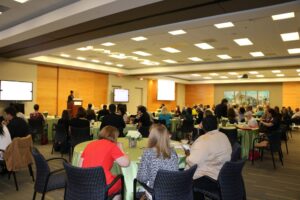
On September 1st, 100+ grantmakers gathered for the Georgia Grantmakers Alliance Annual Meeting to learn about Georgia’s food system and to discuss how philanthropy can strengthen the local food system to promote greater sustainability, better health outcomes, economic development, community building and wellness.
Georgia agriculture contributes over $74 billion to Georgia’s economy annually. Georgia has 9.6 million acres of land devoted to farming, with a major focus on producing cotton, pecans, peanuts and corn, and raising cows and chickens. While we have a productive agriculture industry, much of the food Georgians eat comes from out of state and many Georgians do not have access to fresh, healthy food. At the gathering, Bill Bolling, chair of the Food Well Alliance, explained how growing and connecting the local food system increases everyone’s access to healthy local food, improves health outcomes, reduces food waste, and supports local farmers and in turn the local economy. Producing local food requires nutrients from the soil (compost), local processing facilities, markets to sell the food and a tracking system so that people can identify which food is local; that is why the Food Well Alliance is focused on connecting producers, processing facilities, distributors and consumers.
The work of the Food Well Alliance has not only strengthened the work of local suppliers and brought awareness of the local food movement, but it has also pushed large national distributors to think more critically about how to keep food in their local communities.
Producing good food requires farmers that are dedicated to sustainable farming practices. Will Harris from White Oaks Pastures told the story of his farm. Several years ago, Will decided to transform his farming practices by ending the farm’s dependence on fertilizers and unnecessary antibiotics. While this transition was challenging at first, his farm has transformed to a health ecosystem with rich soil and pasture-raised livestock. Before the transition, the farm relied on just three employees, now the farm has nearly 150 employees, which has boosted the local economy for the small town of Bluffton, Georgia.
Alice Rolls, executive director of Georgia Organics went on to explain that increasing the supply and demand of local food also requires providing farmers with technical support and getting students excited about eating healthy, local food. There is more to running a farm than growing produce. Today’s farmers need to be effective business planners and marketers. Georgia Organics addresses this need by assisting organic farmers in navigating the process of applying for organic certification, tracking the requirements for organic certification, obtaining health insurance and marketing their organic brand to distributors. Georgia Organics also builds demand for local organic products by encouraging schools to bring local food to their cafeterias. Georgia Organic’s Golden Radish Awards recognize schools for their efforts to bring local food into their cafeterias. As the awards have gained popularity and prestige, more schools have started participating and increasing their efforts to serve local food while also engaging students.
Anthony Geraci, commonly known as Cafeteria Man, explained how local food has been introduced and served in Memphis City schools and other school systems across the country. Many assume that local food means greater costs, but Anthony debunked the perception by explaining how supplying school cafeterias with local food can be cost effective for the school system and have a positive impact on the local economy.
In 2015, over 60% of K-12 Georgia students qualified for free and reduced lunch. Schools play an important role in addressing hunger for children. But what about everyone else? One in five Georgians are food insecure, meaning they do not have access to adequate food to maintain a healthy lifestyle. Many live in food desserts, areas without access to healthy and affordable foods. Urban Recipe has established food co-ops to create food security in a way that affirms dignity while providing a sense of support and community. Wholesome Wave increases access to fresh, healthy, locally grown food by doubling the value of food stamps at farmers markets and through a food prescription program that encourages and educations participants to buy and cook healthy food to improve their health outcomes.
Food touches all aspects of the social sector. Food security is not an isolated issue, it is connected to sustainability, school performance, health and the local economy.
—
The Georgia Grantmakers Alliance convenes funders to learn about state-wide issues, share experiences, connect partners, and promote sound policy. Learn more about the Georgia Grantmakers Alliance here.
Categories
- Arts, Culture and Creative Enterprises6
- Book Club26
- Community107
- COVID-1934
- Donor Stories39
- Events30
- Great Grant Stories62
- Higher Ground168
- Housing and Neighborhoods14
- Impact Investing28
- Income and Wealth12
- Media22
- News158
- Nonprofits24
- Philanthropic Resources131
- Place-focused6
- Power and Leadership8
- Press Releases99
- Publications62
- TogetherATL20
- Uncategorized335
